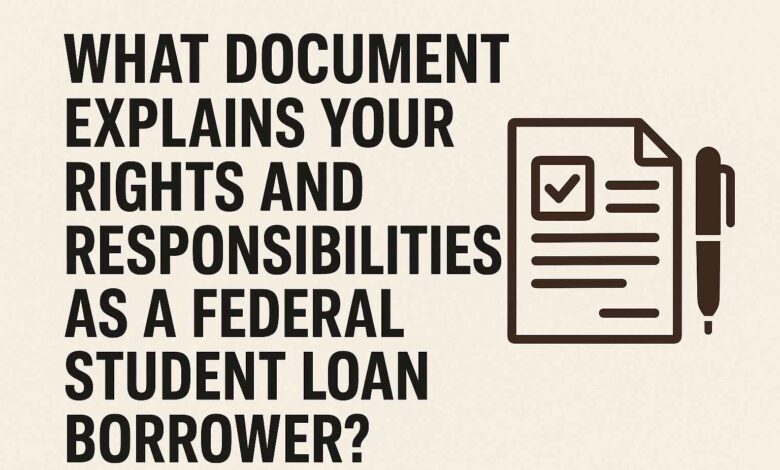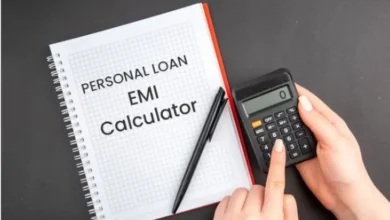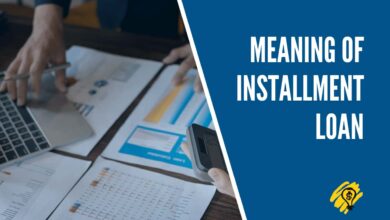What Document Explains Your Rights and Responsibilities as a Federal Student Loan Borrower?

Taking out a federal student loan is a major financial decision, and understanding your rights and responsibilities is essential for managing repayment successfully. Many students sign loan documents without fully realizing what they mean, which often leads to confusion about repayment terms, deferment options, and potential consequences of default. The U.S. Department of Education requires borrowers to be informed, and the central piece of paperwork that outlines all necessary information is the Master Promissory Note (MPN). If you have ever wondered, what document explains your rights and responsibilities as a federal student loan borrower? the answer is straightforward: it is the Master Promissory Note, a legally binding contract you must sign before receiving federal student loan funds.
The Master Promissory Note (MPN): The Core Document
The Master Promissory Note (MPN) is the document that formally explains your rights and responsibilities as a federal student loan borrower. It is a legal agreement between you and the federal government that confirms you understand the terms of borrowing. By signing the MPN, you agree to repay the loan, along with interest and fees, according to the repayment rules established by federal law. Unlike many other financial agreements, the MPN can cover multiple loans for up to 10 years, meaning you do not need to sign a new promissory note each year you borrow under the same program. This single document ensures consistency and accountability, while also making loan processing easier for both the borrower and the lender.
Why the MPN is So Important
The significance of the MPN goes beyond being just a contract. It provides detailed explanations of repayment plans, borrower protections, and consequences for failing to meet your obligations. It also spells out the borrower’s rights, such as deferment, forbearance, and loan forgiveness eligibility. Without this document, borrowers would lack a comprehensive reference point for understanding the federal student loan system. By law, schools must ensure borrowers complete entrance counseling before receiving their first federal loan, and the MPN is a central part of that counseling. This combination of counseling and contractual obligation helps protect both the student and the government.
Key Rights Outlined in the MPN
One of the reasons the Master Promissory Note is so crucial is that it clearly lists your rights as a borrower. These include:
- The right to repay your loan under different repayment plans, including Income-Driven Repayment (IDR), Standard Repayment, and Graduated Repayment.
- The right to request deferment or forbearance in situations of financial hardship, unemployment, military service, or other qualifying circumstances.
- The right to prepay your loan without penalty, allowing you to save on interest by paying more than the minimum required.
- The right to loan forgiveness under specific programs, such as Public Service Loan Forgiveness (PSLF) or Teacher Loan Forgiveness.
These rights ensure that borrowers are not locked into rigid financial arrangements and can adjust repayment based on their evolving circumstances.
Responsibilities Explained in the MPN
Alongside rights come serious responsibilities. The MPN makes it clear that when you borrow federal student loans, you are entering into a binding financial obligation. Your key responsibilities include:
- Repaying the loan in full, with interest, even if you do not complete your program of study, fail to graduate, or are dissatisfied with the education you received.
- Notifying your loan servicer of any changes in name, address, or enrollment status.
- Making payments on time according to your repayment plan, as late or missed payments can damage your credit and lead to default.
- Understanding the full cost of borrowing, including interest capitalization and fees that may apply.
By signing the MPN, you acknowledge that you have read and understood these responsibilities, and failure to uphold them can result in severe financial consequences.
Entrance Counseling and the MPN
While the Master Promissory Note is the document that explains your rights and responsibilities, it is paired with entrance counseling for first-time borrowers. Entrance counseling is an educational requirement that ensures you understand the basics of federal student loans before you take them on. It covers important topics such as how interest accrues, repayment plan options, and the long-term impact of borrowing. The counseling session reinforces the information contained in the MPN, helping students make informed choices before committing to a loan.
Consequences of Ignoring the MPN
Failing to understand or follow the terms of the Master Promissory Note can have serious repercussions. Defaulting on a federal student loan can result in wage garnishment, loss of eligibility for future federal aid, and damage to your credit score. The MPN specifically warns borrowers of these outcomes, ensuring that there is no ambiguity about the stakes involved. Furthermore, defaulting can also result in legal action by the federal government, as these loans are guaranteed and must be repaid. The MPN serves as a reminder that borrowing is not free money—it is a financial responsibility with lasting consequences.
The MPN and Different Loan Types
The Master Promissory Note applies to various federal student loans, including Direct Subsidized Loans, Direct Unsubsidized Loans, and Direct PLUS Loans. While the fundamental terms remain the same across these programs, the MPN explains distinctions, such as how interest accrues differently for subsidized versus unsubsidized loans. For PLUS loans, which are available to graduate students and parents of undergraduates, the MPN also covers additional responsibilities, such as undergoing a credit check. Regardless of the type of loan, the MPN remains the central document outlining borrower obligations.
Loan Servicers and the MPN
Another critical point emphasized in the MPN is the role of loan servicers. After your loan is disbursed, a federal loan servicer is assigned to manage billing and repayment. The MPN informs borrowers that they must maintain contact with their loan servicer and report any changes that could affect repayment. Many repayment challenges stem from a lack of communication between borrowers and servicers, and the MPN underscores this relationship as vital to staying in good standing. Understanding this aspect of the MPN helps borrowers avoid unnecessary complications.
Why Borrowers Should Revisit the MPN
Although you only sign the Master Promissory Note once per loan type or school, it is beneficial to revisit it periodically. Life circumstances and financial situations change, and reviewing the MPN ensures that you remain aware of your rights and responsibilities. It can serve as a guide when choosing a repayment plan, applying for deferment, or considering loan forgiveness. Borrowers who revisit the MPN are often better equipped to make sound financial decisions and avoid default.
Conclusion: The Essential Role of the MPN
When it comes to answering the question, what document explains your rights and responsibilities as a federal student loan borrower? the answer is unequivocal: the Master Promissory Note (MPN). This legally binding contract is more than just a formality—it is a detailed explanation of your repayment options, protections, and obligations. Paired with entrance counseling, it ensures borrowers enter into federal loans with awareness and accountability. Whether you are a first-time borrower or someone managing multiple loans, the MPN remains the foundational document guiding your relationship with the federal student loan system. By reading, understanding, and following it, you take the first step toward successful repayment and financial stability.



